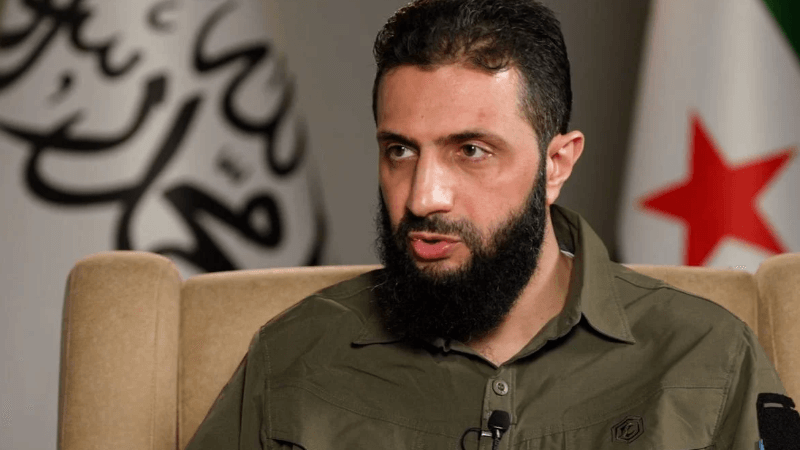Syria’s Rebel Leader Jolani Outlines Plan to Overthrow Assad and Build a New Government Amid Rapid Military Gains

As Syria’s rebel coalition gains ground in its fight against the regime of President Bashar al-Assad, its leadership is increasingly vocal about its ultimate goal: the overthrow of the Assad regime. In an exclusive interview with CNN, Abu Mohammad al-Jolani, leader of Hayat Tahrir Al-Sham (HTS), a militant group originally formed from an al-Qaeda affiliate, outlined his ambitions for Syria’s future. This marks Jolani’s first sit-down interview in years, and his words leave no doubt that the mission of HTS is not just military but also political – aiming to replace Assad’s authoritarian rule with a more democratic governance system.
The Goal: Overthrowing Assad’s Regime
In the interview, held at a secret location within Syria, Jolani made it clear that his group’s primary objective is the removal of Bashar al-Assad from power. “When we talk about objectives, the goal of the revolution remains the overthrow of this regime. It is our right to use all available means to achieve that goal,” Jolani asserted, emphasizing that his group’s commitment to this cause is unwavering. According to Jolani, the regime has long been on life support, with both Iran and Russia attempting to prop it up in the face of mounting opposition. However, he remains firm in his belief that the regime is effectively “dead.”
In the past week, HTS and its allied forces have made significant military advances, taking control of key cities, including Aleppo and Hama, two of Syria’s largest and most strategically important urban centers. These victories have sent shockwaves through the Assad regime, causing tensions to escalate. Jolani’s statements about the regime’s inevitable defeat were punctuated by a sense of confidence, as he positioned his forces as central to Syria’s political future.
A More Modern, Political Leader
Once known for operating in the shadows, Jolani has increasingly projected himself as a political figure rather than just a militant leader. In stark contrast to his earlier interviews, where he would often speak from behind a shadowed veil, Jolani appeared before CNN’s cameras in broad daylight, exuding a newfound confidence. The interview took place just after HTS forces captured the city of Hama, a moment that Jolani seemed eager to discuss, framing it as a significant victory for the opposition.
Jolani also made efforts to distance himself from his past ties to extremist groups like al-Qaeda. While he acknowledged that HTS’s origins lie in the al-Qaeda-affiliated Jabhat al-Nusra, he claimed that the group’s evolution over the years has led it to abandon some of the more extreme practices associated with its past. HTS officially broke with al-Qaeda in 2016, transforming itself into Hayat Tahrir al-Sham in an attempt to rebrand as a more nationalist force focused on the liberation of Syria, rather than as an international jihadist movement.
HTS and the Future of Syrian Governance
Despite its violent origins, HTS claims to be focused on creating a governance system for Syria that is based on institutional development and popular participation. Jolani spoke about plans to create a “council chosen by the people” that would act as the foundation for future governance. He assured those listening that, if successful, the overthrow of Assad’s regime would lead to the establishment of a Syria governed by institutions and systems, rather than a dictatorship or sectarian control.
“This will not be a regime that is based on a single ruler making arbitrary decisions,” Jolani said. Instead, he envisions a Syria that moves away from autocratic rule and towards a model where governance is more representative and institutionalized. His remarks were part of a broader vision for Syria, one that rejects sectarian violence and calls for peaceful coexistence among the country’s diverse religious and ethnic groups.
Reassurances to Syria’s Minorities
One of the major challenges for any rebel group in Syria is winning the trust of the country’s minority populations, especially those who have historically been persecuted or marginalized. Syria’s Christian and Alawite populations, in particular, have been fearful of the rise of Islamic governance, due to the history of sectarian violence and oppression at the hands of some militant factions. Jolani’s leadership of HTS has often been viewed through the lens of its roots in extreme Islamism, raising concerns about how minorities would fare under HTS rule.
In an effort to allay these concerns, Jolani emphasized that HTS had taken steps to reassure religious and ethnic minorities in areas under their control. He pointed out that despite some instances of abuses by individual members of the opposition forces, HTS as an organization had made it clear that such behavior would not be tolerated. “These sects have coexisted in this region for hundreds of years, and no one has the right to erase them,” Jolani said, noting that any violations against minority groups were quickly addressed by the leadership.
Despite these reassurances, human rights groups have raised alarm about HTS’s treatment of political dissidents, particularly in areas like Idlib, where the group has reportedly conducted harsh crackdowns on protests. Jolani responded to these allegations by claiming that any incidents of abuse were carried out by individuals acting outside the group’s directives and that those responsible had already been held accountable.
Challenges and the Road Ahead
As HTS consolidates control over more territory, the challenges of governing a fragmented country continue to loom large. With foreign powers like the US, Russia, Iran, and Turkey involved in Syria, Jolani stressed the importance of ending foreign military interventions. He argued that Syria could not truly heal until these foreign forces left the country, and that the removal of Assad’s regime would eliminate the need for external military presence.
Jolani’s vision for post-Assad Syria is one of reconstruction, not just politically but economically as well. He has called for an end to the chaotic, fractured state that has plagued the country for over a decade. If the rebels succeed in toppling the Assad regime, Jolani believes that the people of Syria will have the opportunity to rebuild a better nation.
“We are talking about a larger project – we are talking about building Syria,” Jolani concluded. “Hayat Tahrir al-Sham is merely one part of this dialogue, and it may dissolve at any time. It is not an end in itself but a means to perform a task: confronting this regime.”
A Divided Syria
The military and political situation in Syria remains volatile, and the future of the country remains uncertain. While HTS and its allies have made significant territorial gains, the situation is far from settled. Assad’s regime, bolstered by Russian and Iranian support, remains entrenched in several parts of the country, particularly in the capital, Damascus. Yet Jolani’s growing influence and the continued momentum of the rebel forces have introduced new dynamics into the civil war, raising questions about the long-term viability of the Assad regime.
As the war continues to evolve, the future of Syria hinges on the ability of groups like HTS to transition from military resistance to political leadership. Jolani’s interview reveals a leader who is not just focused on military victory but also on the challenge of governance and the reconstruction of a war-torn country. Whether or not his vision for Syria will be realized is uncertain, but for now, HTS’s momentum in the fight against Assad shows no sign of slowing down.




